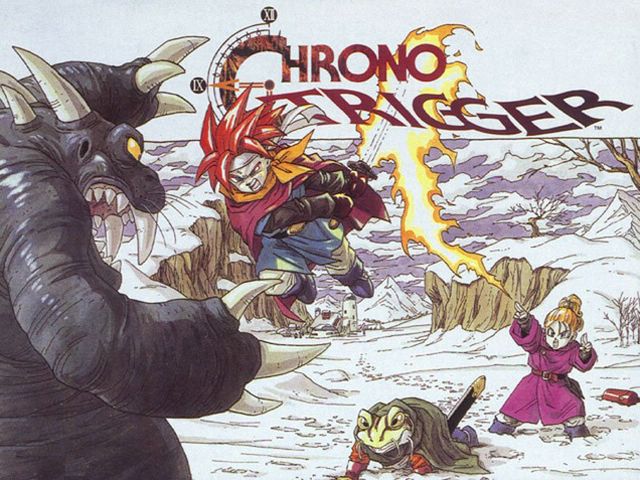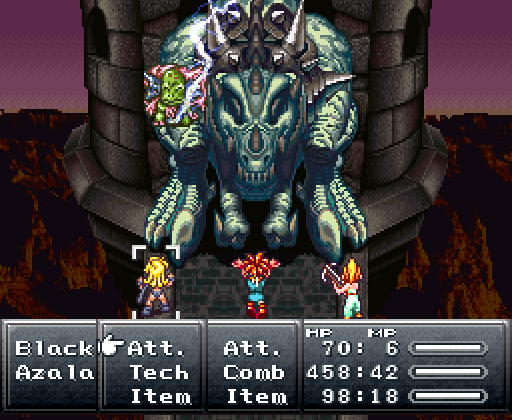
Ever since reading Killing Is Harmless by Brandon Keogh, a thorough examination and analysis of the criminally unappreciated Spec Ops: The Line, I have become quite interested in the manner in which writing about video games is evolving. After several decades of reviews, news articles, and editorials, it seems like there is a growing interest in taking the time to delve deeper into individual games. I feel this is another indication of video games growing as a medium for entertainment and artistic expression. In other words, games are finally being given the attention they deserve.
With this point of view in mind, it is easy to understand that I was quite excited for the opportunity to read a book analyzing one of my favorite games that is being published by people dedicated to exploring long-form writing about games. Not only did Boss Fight Books make a smart choice in wanting to put out a book about the sprawling epic that is Chrono Trigger, it also handed the reins to a phenomenal writer. While I personally think the decision to simply entitle the book Chrono Trigger is somewhat lacking in imagination, author Michael P. Williams has delivered a surprisingly innovative piece of non-fiction that blazes a trail that more writers should follow.
The first thing that Chrono Trigger deserves credit for is what it doesn’t do. Whenever writing a review, whether it be long or short, it is far too easy to get bogged down in needlessly regurgitating plot and characters’ details at the expense of worthwhile insight. The author obviously understands this concept and walks the line by providing just enough of these details to make his point and keep the reader aware of what is going on. One could perhaps argue that there isn’t enough basic information to bring people completely unfamiliar with the game up to speed, but this really isn’t a book meant for the uninitiated.

Just as Michael P. Williams has little interest in making his work easily accessible to people who have never played Chrono Trigger, he also expects a measure of intelligence not demanded by most game writers, though I guess that is to be expected from someone who has a day job in academia. Anybody who reads the book would be best served by having some measure of familiarity with the work of Joseph Campbell, as there is a chapter examining Chrono’s adventure through the lens of the monomyth concept. Also, if the idea of reading a breakdown of the game based on the role of gender sounds boring to you, then perhaps this really isn’t the best reading material. And how do you feel about a look at how the game remains imbued with strong Japanese cultural elements despite the fact the developers were doing their best to make the game feel less Japanese? However, if these proposals have your brain tingling, then I highly recommend jumping on in. I don’t want to spoil anything, but I will say that Williams’s take on many of these matters went in directions I didn’t expect and had me looking at Chrono Trigger in a different light.
All of this being said, the fact remains that Chrono Trigger is not an academic work; the tone is much less formal and more personable than something you would find in a scholarly journal. Writing about video games going down that route will no doubt grow more common as more and more gamers enter the realms of higher education, but I think the tone set by Williams could prove much more compelling and is better fitted to the spirit of gaming. You see, video games are an intensely personal experience; though each person experiences the same mechanics and story, the interactive nature of the experience leaves each player with a more personalized impression. Williams communicates this by really making the book about himself as much as it is about the game.
Yes, there are plenty of nostalgic stories about Williams playing the game as a child and revisiting the game through its different versions as he grew older, but there are stories about his life experiences, such as the time he spent living in and studying Japan, and how that would come to inform his opinion of the game. I personally found this to be so compelling because instead of feeling like a flat lecture, reading the book almost becomes a conversation. On one page you are nodding in agreement to the blissful nostalgia at the mention of learning about the game through Nintendo Power or playing the game while mom watched Days of Our Lives in the other room (by the way, I love the specific example of the demonic possession story arc), and then in the next chapter you are shocked to learn that his opinion of the extra ending in the DS version differs drastically from yours. I guess the best way to put it is that with each and every page you fully understand the love the author has for his source material and how excited he is to be sharing it with his readers.

Believe it or not, the discussion about gender roles actually makes this scenario more interesting.
Before I close out this review, I want to bring up one chapter that I think instantly makes this book a must read for anybody who loves Chrono Trigger or has an interest in the process of game localization. The book contains two interviews, one with Tom Woolsey, the man responsible for the original localization of the game, and Tom Slattery, who reworked and expanded upon the localization for the DS re-release. Some might find this stuff boring, but to me it was a treasure trove of incredibly fascinating and enlightening information. I especially feel the Woolsey interview should be mandatory for anybody who dislikes his work on the SNES original. Let’s just say that saying something in English usually requires a lot more characters than saying it in Japanese, and when you realize Chrono Trigger was the largest, and thus most expensive, SNES game in terms of sheer memory at the time, then you can understand how significant each and every letter can be. And do you remember Nintendo of America’s strict censorship in the ’90s? All I’m saying is the guy deserves a lot more credit than some people give him and these interviews really show you why.
If I were to pretend I were a literary critic I suppose I could find more to dislike about Chrono Trigger; there is some vulgarity that comes from out of left field every now and again, and I guess the fact that each chapter is clearly segmented kind of hurts the overall flow. But I’m not a literary critic; I write about video games because I love video games. So, from that perspective, Michael P. Williams has succeeded in putting together an enjoyable and thought provoking read that manages to celebrate Chrono Trigger while providing valuable insight and new perspective into the nearly twenty year old game. I still wouldn’t necessarily recommend the book for those who have never played the game, especially if you haven’t heard all the spoilers by now, but I figure it might, at the very least, encourage you to finally pick up what is considered by many to be one of the best games ever made. As for long time fans of Chrono Trigger, I think you are bound to find something to love, and that’s not including the wonderful nostalgia trip you are almost guaranteed to go on.




 ShareThis
ShareThis







Can’t wait to read it. I read Earthbound and it was brilliant, too.